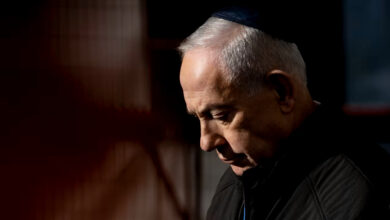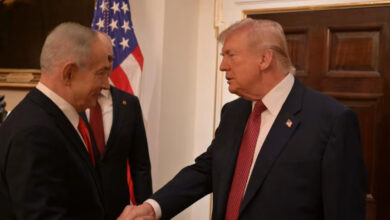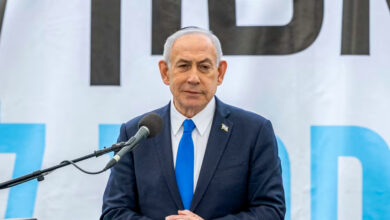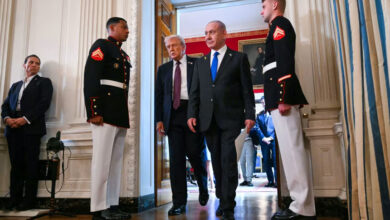President Mubarak’s meeting yesterday with Israeli Prime Minister Benjamin Netanyahu was the lead story in Al-Ahram and Al-Akhbar, the two leading government-run dailies. The former described the meeting as an attempt to renew peacemaking efforts and reportec that President Mubarak asked the Israeli PM to take steps towards “relieving the Palestinian people of their suffering.” Mubarak also reportedly brought up the contentious new settlements the Israeli government plans to build in East Jerusalem. Netanyahu’s responses went unreported.
According to Al-Akhbar’s version of the meeting, President Mubarak was slightly more aggressive. That newspaper said that the Egyptian president firmly denounced the Israeli government’s actions and called them "unacceptable." According to Foreign Minister Ahmed Abul Gheit, the meeting was “extremely positive, as the Israeli PM was given ample opportunity to clearly express his point of view, to which President Mubarak responded with the country’s point of view.” As with Al-Ahram, Prime Minister Netanyahu’s comments were not reported.
Al-Akhbar also focused on Gilad Shalit, the Israeli soldier held captive by Hamas since June 2006. When asked if he believed that Shalit’s release would lead to better relations between Israelis and Palestinians, Mubarak replied, “We cannot go into the details of this case. It’s obvious that Shalit’s situation depends on the Palestinians. At the moment, Hamas is in Syria, dealing with the issue. We will know the outcome when they send a party to Cairo.”
Al-Akhbar also quoted Abul Gheit on the underground wall reportedly being built on Gaza border to prevent smuggling tunnels. “I know nothing about a wall. There is a wall above the ground that the Egyptian government built years ago and which it is currently rebuilding, thanks to the damage done to it over the years by our brothers in the Hamas movement. What the Egyptian government is doing now is national infrastructure in the interest of Egyptian security, the details of which cannot be revealed.”
Al-Ahram and Al-Akhbar issued almost identical reports on both Prime Minister Ahmed Nazif’s trip to Ethiopia and the Shura Council’s meeting on border security. In the former story, Nazif met with Ethiopian Prime Minister Meles Zenwai to discuss ways to encourage future Egyptian-Ethiopian trade and mutual investment. Nazif was accompanied by the ministers of electricity, agriculture, industry and trade, and health, as well as a number of prominent Egyptian businessmen.
According to Al-Ahram and Al-Akhbar reports, the Shura Council is approving the recent measures taken by the government to further secure the borders and clamp down on the smuggling of weapons. Speaker Safwat el-Sherif assured those present at the meeting that “bidding on Egypt is completely unacceptable, and that no individual would ever be allowed to turn Egypt into a betting chip to be lost in risky political gambles.” El-Sherif went on to reiterate the necessity of securing Egyptian borders for the sake of the country, before citing the recently constructed Egypt-Gaza wall as an example.
The state-owned papers also reserved some space for the story of Deputy Governor of Cairo Mahmoud Yassin, who was recently charged with murder for last year’s rock slide in the neighborhood of Duweiqa that killed almost a hundred people. Al-Ahram reported that 14 other district officials have been charged, while Al-Akhbar and Rose Al-Youssef put the number at seven. A verdict and subsequent arrest warrants were issued by Counselor for the Public Prosecutor Abdel Maguid Mahmoud based on new evidence that officials were warned of the danger of a rock slide more than a year in advance but failed to take any precautionary measures. (Al-Akhbar reported Mahmoud’s name as Abdel Hamid.) In a rare case of swift government action, the accused are currently behind bars awaiting trial.
Mahmoud Yassin also made it onto Al-Shorouq’s front page, although in a slightly less shameful context. A taxicab service exclusively for women has been approved by the Deputy Governor, based on a proposal by City Cab. The women-only cars will be driven by women, stopping only for women, and will be painted a “feminine color,” according to Al-Shorouq. “There are still certain legal issues that must be worked out concerning any potential passenger’s equal right in hailing a cab and not being refused its service,” the alleged murderer said.
The Duweiqa story was given slightly more prominence in Al-Wafd, where it shared the headlines with Israeli PM Netanyahu’s visit to Egypt, albeit from a different angle that focused more on President Mubarak’s unique position in terms of influence on Palestinian leader Mahmoud Abbas.
Al-Wafd also reported on swine flu vaccinations, which are scheduled to begin on Sunday in elementary schools all over Cairo—a campaign that would see 761,000 students vaccinated over ten days. The initiative was approved by Cairo Governor Dr. Abdel Azim Wazir, who recently shut down 13 schools and nine classrooms for 15 days following a rise in cases of infected students.
Al-Shorouk stuck with the swine flu them with a headline promising the first Egyptian-made vaccine for the flu by 2011. Reportedly, the government is currently finalizing deals which will see a factory built in 6th of October City within the next year. The factory, which represents an investment of approximately LE100 million, will predominantly produce vaccinations to combat both swine and avian flu.
In the meantime, imported vaccinations are, according to Adel Khattab, Counselor to the Minister of Health, “perfectly safe, and fears of giving them to your children are unjustified and unfounded.”
Al-Shorouq also reported on mass arrests in Iran as the government struggles to subdue crowds of protestors. Eight people have been killed in what the local press describes as the most violent day of rioting since President Mahmoud Ahmedinejad’s re-election in June. In the midst of the upheaval, Iranian authorities have reportedly arrested the prominent journalist and political analyst Mashallah Shams Al Waezeen as well as the sister of Shereen Abadi, a Nobel Peace Prize winner.
Finally, Al-Dostour traded in its staff for contributions from 16 of the “most influential stars of song and cinema,” as well as a riveting story on “The Nine Most Famous Animals of 2009.”




